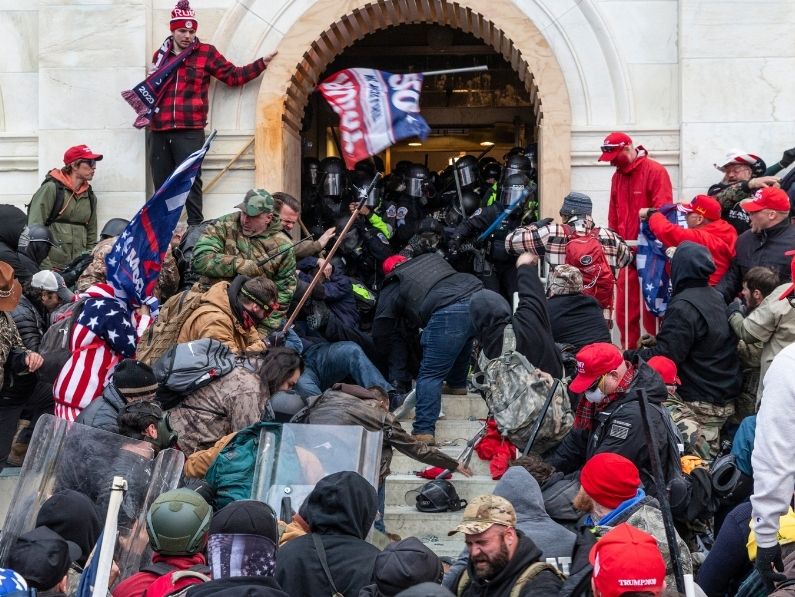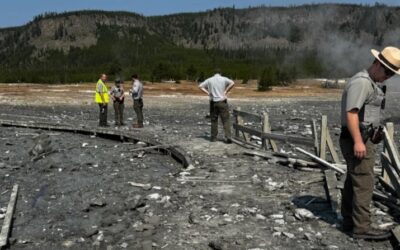Law enforcement officials across the country are ramping up surveillance and security protocols in advance of the inauguration of President-elect Joe Biden. In an Email to Jackson Mayor Hailey Morton Levinson, a concerned citizen with the organization Amnesty International warned that white supremacists and other anti-government militia groups are planning “further disruption across the country in the coming days and weeks.” Whether or not that will affect Teton County—or if these groups even exist here—is still unknown.
It might seem far-fetched to think that white supremacists or anti-government militia could eventually have a presence here. But domestic terrorism scholar Michael German says liberal towns like Jackson have cause for concern. German is a former FBI agent and a fellow with the Brennan Center for Justice. He is the author of the book Disrupt, Discredit, and Divide: How the New FBI Damages Democracy. In the wake of the attack on the U.S. Capitol, German’s expertise could help local officials prevent violent extremism here. Below is an edited transcript from an interview with German conducted in October:
Daly: Michael, tell me how things have changed since you were an undercover FBI agent in the 1990s?

Michael German is a fellow with the Brennan Center for Justice’s Liberty and National Security Program. (Courtesy Photo)
German: Through the late 80s and 90s, law enforcement understood what white supremacists and militants were doing when they organized public rallies—which was to draw out their opponents so they could attack them—and made sure they couldn’t accomplish their goal. They would take law enforcement action, if necessary, to make sure that the violent elements within those groups were punished. And that made it less likely that the violent elements would come out. So when I was undercover in the 90s, the groups I was dealing with were actually manufacturing and using explosives and trafficking in machine guns and other deadly weapons, they wouldn’t go near public protests— or very rarely—because they knew that they would be subject to scrutiny if they went to those protests.
Clearly today, the most violent elements believe they can come to the protests and actually make themselves famous. They can become celebrities within the movement for the violence they mete out at these protests. And law enforcement is not taking sufficient action to dissuade them from that activity.
Daly: There have been a lot of articles recently about the rise of far-right militia groups in western states. But you say that’s not the whole picture.
German: I think that’s because they receive more media coverage. It sort of fits the narrative better to think of this is a problem in the Deep South and Mountain West, and that the rest of the country is just fine. But that’s never been true. These groups are everywhere. They’re obviously in the most liberal cities in the country and elsewhere. All of our institutions are infected by the white supremacy that was foundational to the creation of our country. White supremacy was the law for hundreds of years after slavery was banned.
Daly: And why should law enforcement agencies themselves need to worry about white supremacist officers?
German: Far-right militant groups tend to kill police officers and, in fact, have recently killed police officers. So when I see law enforcement acting in a friendly manner to these groups and allowing them to engage in violence against the President’s perceived enemies, they’re creating a dangerous element that will harm other law enforcement officers eventually.
Daly: Jackson is often called a blue dot in a red sea. But even though the county predominantly votes Democratic, in other towns quite near to us we’ve seen a rise in these militant groups—places like Cody, Wyoming, and Dubois, Wyoming. The state of Idaho was also named the most hateful state in the nation in 2018, and a militia leader ran a losing bid for the Idaho state senate in 2020. Why should a town like Jackson be concerned about the kind of activity we see in neighboring communities?
German: Understanding how these far-right militant groups work is important because their tactic is to target communities where they know they have political opposition. That’s why the protests are happening in Portland, in Charlottesville, Virginia, and in Berkeley, California. The idea is to host the march—or some kind of public rally—knowing that the opposition will come out to protest your event so that you can attack your opposition.
Even if it wasn’t actual residents of Jackson, Jackson would look like an appropriate target for these groups in the vicinity. Because, again, they want to go and target communities where they know they have opposition. Certainly, it’s something that is worth taking precautions for upfront, rather than waiting until you have a problem and trying to create policy during the crisis.
Daly: What can Jackson’s local law enforcement agencies do to keep extremists out of their organizations?
German: I think the first thing to do is to talk with law enforcement and find out what policies they have in place to address white supremacy, racism, and participation in far-right militant groups by law enforcement officers. Part of the problem is that, typically, there aren’t specific policies. And so when law enforcement agencies do their initial screening of applicants—and when they do background investigations for on-duty officers—they don’t have a specific policy to hold that the officer to account to with regard to their social media activities, for example, or their tattoos, or their involvement in white supremacist activities.
One first step is to make sure that law enforcement leaders know that that the community is concerned about this issue and that they should have effective policies that get vetted through their legal departments to ensure that they meet the standards necessary to survive challenges afterward.
I’m sure the vast majority of officers or deputies in these departments don’t benefit from having a white supremacist colleague and would rather see that person removed from service. So the idea of backing the blue isn’t backing in the worst elements that exist within law enforcement. It’s backing the best.





